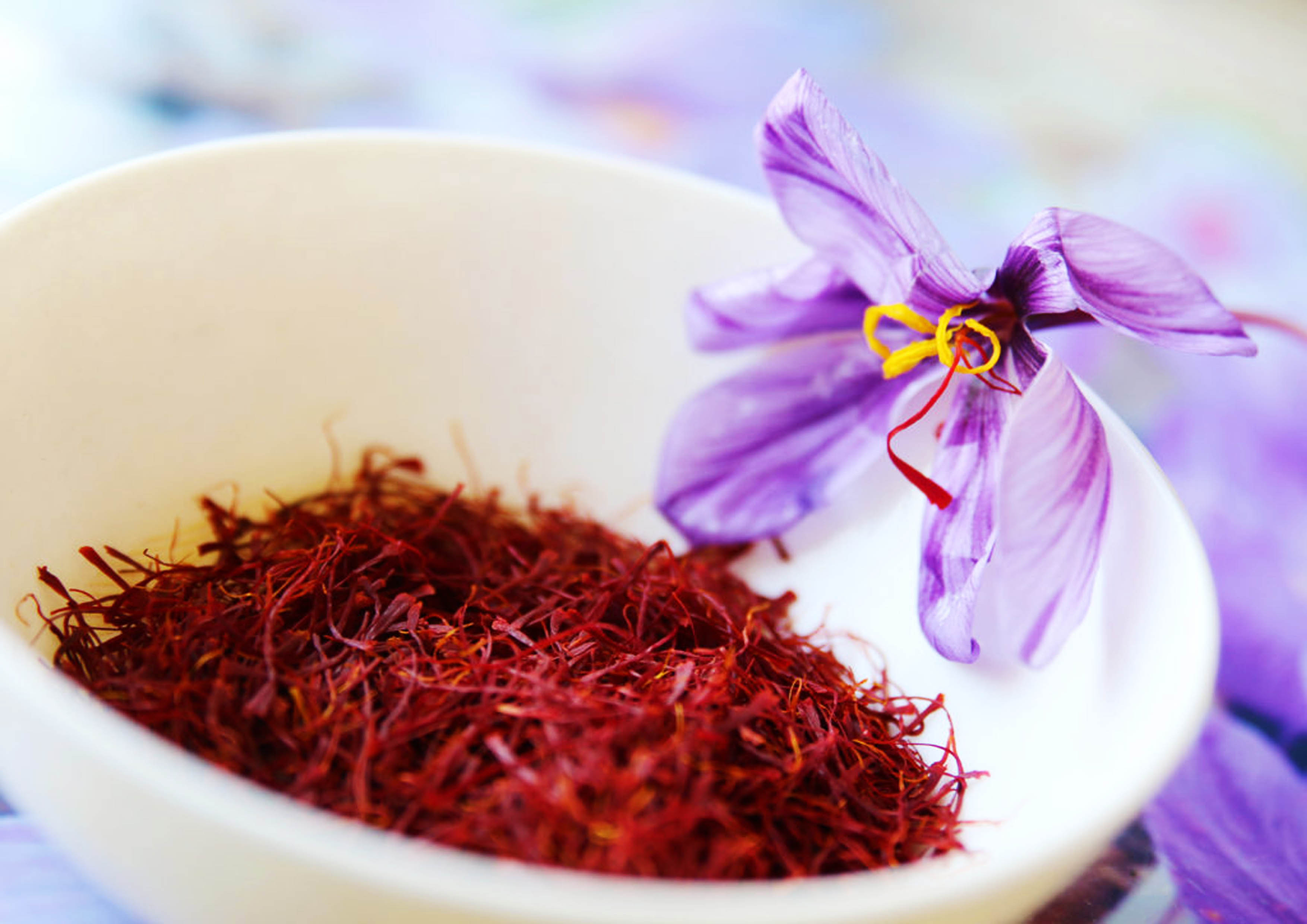The health benefits of saffron are so significant that modern medical science has begun to pay attention. Most notably, saffron’s bioactive compounds like crocin, crocetin, picrocrocin, and safranal have stolen the spotlight. Read on to learn what this superstar spice can do for you.

Fights Cancer
Studies have shown that cancerous rats treated with saffron aqueous extract showed improvement in their condition. And crocin, the compound in saffron, had inhibited the growth of colorectal cancer cells (while it left the healthy cells unaffected). It also had shown similar effects in the case of hepatic and prostate cancers. The spice had also played a major role in treating skin cancer.
Saffron is rich in carotenoids, which can contribute to its anticancer properties. Crocin in saffron can prevent breast cancer and leukemia. However, further research is warranted.
As per a report by the American Council of Science and Health, crocetin (a carotenoid related to crocin) in saffron can block the proliferation of two types of human cancer. It achieves this by inhibiting an enzyme that is particularly active in cancer cells. Though this may not brand saffron as a superb anticancer food, the spice does hold great promise.
According to another study, crocetinic acid (a purified compound from crocetin) has the potential to inhibit pancreatic cancer. In fact, the compound obstructs cancer stem cells – destroying them, which prevents the cancer from returning.
Aids Arthritis Treatment
An Italian study states that crocetin in saffron can enhance cerebral oxygenation, consequently facilitating arthritis treatment. According to the University of Maryland Medical Center, one variety of saffron (meadow saffron) can be effective in relieving gout. However, it must not be used by elderly patients with liver, kidney or bone marrow disorders – and neither by pregnant women.
Improves Vision
A Spanish study states that the natural compounds in saffron can help prevent vision loss and retinal degeneration. Safranal, one of the compounds in the spice, was found to preserve photo-receptor morphology (the mechanism in the eyes that helps study the forms of things you see), visual response, and capillary network.
Saffron supplementation to ongoing treatment was found to improve macular thickness in patients. This significantly improves retinal function. Saffron was also found to prevent photo-receptor damage induced by chronic oxidation injury.
And as per a report by The University of Sydney, saffron was found to improve vision in the elderly. In the test, the patient’s vision had improved after taking saffron pills. Saffron affects the genes that regulate the fatty acid content of the cell membrane – and this makes vision cells more resilient. The study indicates saffron’s potential in treating retinitis pigmentosa, a genetic disease that causes permanent blindness in young people.
Cures Insomnia
Though research is limited, certain studies say that saffron can cure insomnia. Other studies show that saffron can help in treating depression, and insomnia related to the condition.
In yet another study, crocin in saffron was found to improve non-rapid eye movement sleep in laboratory mice. More importantly, the compound didn’t show any adverse effects (like rebound insomnia) after sleep was induced in the mice.
Boosts Brain Health
Numerous studies show saffron to be effective in treating learning and memory impairments. In one such study, administering 30 mg of saffron a day showed improvement in the condition of patients with Alzheimer’s disease. Also, crocin and ethanolic extracts of saffron displayed antidepressant effects in rodents. Saffron supplementation had also largely improved the mood of the subjects in another study. Saffron aqueous extract was well tolerated even by schizophrenic patients, with no serious side effects.
Treatment with saffron extract had also lessened certain neurotoxic effects. Similar extracts had even increased the production of important neurotransmitters like dopamine and glutamate. The spice had shown to improve memory as well.
Studies also propose a protective role of saffron in cerebral ischemia (inadequate blood supply to the brain). Preliminary studies also hint at saffron’s ability to treat depression. These cognitive benefits of saffron can be attributed to its antioxidant reinforcement .
Helps Cure Asthma
Reports throw light on saffron’s use for asthma since the ancient times. Traditional medicine has mentioned the use of saffron for this purpose. However, research is limited. Hence, consult your doctor for more details.
Promotes Digestion
Saffron was found to play a key role in promoting digestion and treating digestive disorders through its antioxidant effects and radical scavenging, and anti-inflammatory properties. It also shows potential in treating peptic ulcers and ulceration colitis.
Heals Wounds
Saffron can also heal wounds, especially those caused by burns. The spice was found to increase re-epithelialization in burn wounds
Enhances Immunity And Energy Levels
The carotenoids in saffron can positively affect immunity. A study has found that sub-chronic use of 100 mg of saffron daily can have a temporary immunomodulatory activity without any harmful effects. Saffron petal extract was also found to increase the antibody response in laboratory rats. Saffron is also believed to improve energy levels
Gastrointestinal Effects
One of the oldest and most well known uses of saffron is for upset stomachs and excess flatulence. The sedative and anti-inflammatory nature of saffron helps to calm the stomach and reduce inflammation, which eases things like constipation, bloating, cramping, and more serious conditions like gastric ulcers.
Circulation Issues
Saffron can function as an effective energy booster and can increase your metabolism by increasing your blood circulation. The high concentration of iron means that saffron increases your RBC, which thereby stimulates circulation and oxygenation of organ systems and the body’s extremities. This improves efficiency and functionality of our tissues and organ systems for healthier metabolic activity and prevents the symptoms of anemia.
Blood Pressure and Heart Health
Improving the health of the heart seems to be one of the top goals in human health today, and one simple way to do this is to increase your potassium intake. Potassium acts as a vasodilator, effectively lowering the stress and pressure on blood vessels and arteries, allowing blood pressure to decrease and relieving strain on the cardiovascular system. This can prevent things like atherosclerosis, heart attacks, and strokes from occurring.
Controls Diabetes
The significant levels of manganese can help the body optimize its blood sugar levels. Diabetes is one of the most dangerous and widespread conditions in our world today, affecting millions of people globally. By regulating your blood sugar, insulin, and glucose levels, you can effectively prevent the onset of Type II diabetes, or manage the symptoms if you already suffer from this affliction.
Mood and Anxiety
Saffron has been known to relieve mild depression and improve mood in those who regularly consume it. The many active compounds in saffron have some effect on the endocrine system and can stimulate the release of beneficial hormones that keep us happy and healthy. For women, this same effect has also been known to act as an aphrodisiac. It has been hailed as a natural antidepressant by numerous research studies and organizations.
Improves Bone Strength
Some of the minerals and organic compounds in saffron have been linked to optimized nutrient uptake, particularly of calcium. By maximizing the amount of calcium that our body’s can absorb from food, we have a better chance of improving bone mineral density and preventing the onset of conditions like osteoporosis and other degenerative age-related diseases.
Nerve Function
The vitamin B family is one that is often overlooked in human health, but it plays a major role in nerve function throughout the body. More specifically, the high content of vitamin B6 found in saffron spice can help our nervous system running smoothly and prevent some of the deadly and dangerous disorders that arise from poor nervous system function.
Analgesic Qualities
Pain relief is always a valuable asset to an herb or natural remedy, and the volatile compound safranal in saffron acts as a sedative for many patients. This sedative action can help to relieve pain, reduce anxiety and stress, improve sleep patterns, and generally soothe the mind and body, which is always a good thing!


